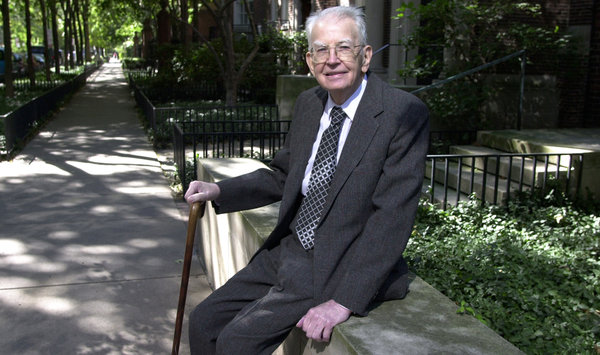The notion that liability should be imposed on the “cheapest cost-avoider,” as the shorthand has it, was not just unheard-of but deemed implausible in the extreme.
Using the example of a polluting factory, it’s cheaper to assign primary responsibility to the factory not because it’s “at fault” but because the alternative, assigning responsibility to the downwind neighbors, would incur insuperable transactions costs as they attempted to organize into a coherent bloc to negotiate with the factory, all the while avoiding the devilish problems of free-riders, holdouts, and so on. But Coase’s fundamental insight was that no matter where liability was assigned the same ‘optimal’ level of pollution would be negotiated.
This was so counterintuitive that the famous story is told of Coase having to defend his thesis (here, from the University of Chicago Law School’s essay on Coase’s passing):
Coase described being invited to defend [a previous paper on the FCC’s allocation of broadcast spectrum asserting essentially the same thesis] at University of Chicago Professor Aaron Director’s home. He was able to persuade them to his view that as long as legal rights are properly defined, efficient solutions will prevail. He was asked to write an article for The Journal of Law and Economics, which Director had recently founded. The outcome was “The Problem of Social Cost.”
“Had it not been for the fact that these economists at the University of Chicago thought that I had made an error in my article on The Federal Communications Commission, it is probable that ‘The Problem of Social Cost’ would never have been written,” Coase said.
George Stigler, an economist at UChicago and 1982 Nobel Prize winner, later wrote about that night: “We strongly objected to this heresy. Milton Friedman did most of the talking, as usual. He also did much of the thinking, as usual. In the course of two hours of argument, the vote went from 21 against and one for Coase to 21 for Coase.
“What an exhilarating event! I lamented afterward that we had not had the clairvoyance to tape it.”
Coase was born in the London suburb of Willesden in 1910, the son of two Post Office workers who both ended their schooling at age 12. He earned a scholarship to the London School of Economics where Sir Arnold Plant, a well-known economist at the time, introduced him to Adam Smith’s invisible hand and helped him win a scholarship to travel to the US to investigate the structure of American industry. Coase would always refer to himself as “an accidental economist,” and indeed his two famous papers are remarkably equation- and jargon-free. Richard Epstein, writing his own memorial of Coase, described their last meeting, last year:
He thought that the wave of the future involved understanding China and in starting a scholarly publication called “The Journal of Man,” which would be designed to rid economics of what he termed the sins of “blackboard economics,” which did not draw its inspiration from the behavior of real individuals in concrete contexts.
Epstein distills Coase’s value to us today:
Why was Ronald so great? The answer is not because he was smart. In fact, I suspect that by the usual measures of intelligence Ronald would not do well against the types who excel in proving mathematical theorems or solving crossword puzzles. No, Ronald was not “smart.” But he was brilliant. He could look at the most mundane facts of ordinary life and distill from them insights about how the world worked — and, indeed, had to work.
After emigrating to the US in 1951 and teaching at SUNY/Buffalo and the University of Virginia, among other places, he was appointed to the Chicago Law School faculty in 1964 and stayed there the rest of his life. His wife of more than 75 years, Marion, died last year.



